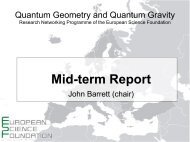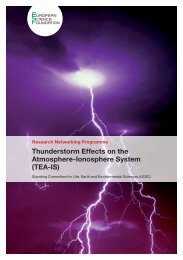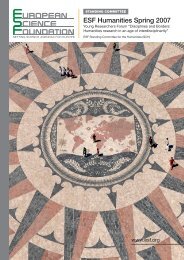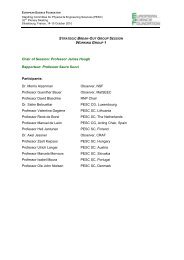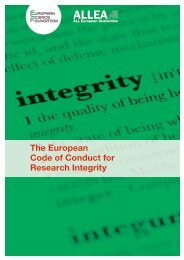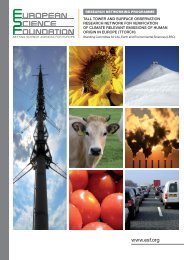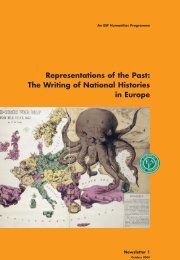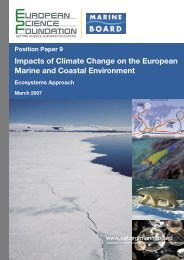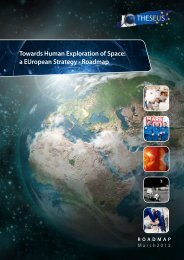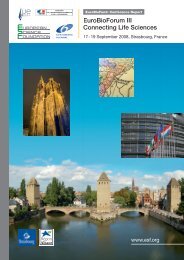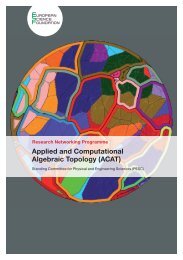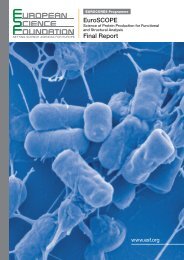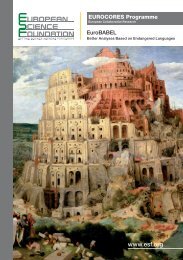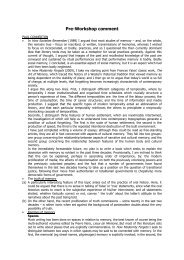Synthesis Report - European Science Foundation
Synthesis Report - European Science Foundation
Synthesis Report - European Science Foundation
Create successful ePaper yourself
Turn your PDF publications into a flip-book with our unique Google optimized e-Paper software.
Recommendation 4:Develop sustainability educationand learning that builds capacityfor knowledge sharing and researchacross disciplines in an innovativeopen knowledge systemTarget audience: <strong>Science</strong> and educationpolicy makers, educatorsLearning is the central element of an openknowledge society and essential for adaptingto the complex and changing human conditionin the Anthropocene. Processes are requiredthat engage educators from pre-school throughuniversities and far beyond, including a widerange of other professional areas, in a dialogueabout the education and capacity buildingframeworks and institutions needed for anopen knowledge and learning society. The newtypes of research needed to support sustainabilitytransitions and processes of engagementneed new skills and capacities that must be providedby the education system.Good Practice Example:Knowledge, Learning and Societal Change(KLSC) ProjectLocation: International Human Dimensions Programmeon Global Environmental ChangeMain actors involved: The project will create a collaborativecommunity of people from the sciences,humanities and social practice, including participationin knowledge production by those living inkey affected localitiesTime frame: Draft <strong>Science</strong> Plan published in 2011Description: The Knowledge, Learning and SocietalChange (KLSC) project aims to better understandand explain the gap that currently existsbetween knowledge and action, so that steps canbe taken to help societies move in more sustainabledirections. Developing strategies for appropriateaction requires greater insight into the driversof global change and the behavioural transitionsneeded to avoid or respond effectively to possibleeffects. Understanding the complex mechanisms,dynamics and outcomes of the interplay betweenknowledge, learning and societal change will becrucial in guiding optimal policies and societaldevelopment toward a more sustainable global system.The implementation of the KLSC project willprovide essential support to the implementation ofthe RESCUE Vision.More information: www.klscproject.orgRecommendation 5:Respond to the challenges andopportunities created by the internetfor an open knowledge system readyfor transitions towards sustainabilityTarget audience: <strong>Science</strong> policy makers,research and education communityThe internet provides a means of access toknowledge, a repository of knowledge, a researchtool and an agora that facilitates theproduction, diffusion and use of knowledge inresponding to societal problems related to globalenvironmental change. There is a need to discussthe role of the internet in an open knowledgesociety especially with regard to issuesof credibility of knowledge. At the same time,there is a need to embrace the opportunities offeredby the internet for creating networks orbringing them together.Good Practice Example:Climate of the Past review processThe open access journal Climate of the Past (CP)published by the <strong>European</strong> Geosciences Union(EGU) has an innovative two-stage publicationprocess that involves a scientific discussion forumand exploits the full potential of the internetto:• foster scientific discussion;• enhance the effectiveness and transparency ofscientific quality assurance;• enable rapid publication;• make scientific publications freely accessible.In the first stage, papers that pass a rapid accessreview by one of the editors are immediatelypublished on the Climate of the Past Discussions(CPD) website. They are then subject to InteractivePublic Discussion, during which the referees’comments (anonymous or attributed), additionalshort comments by other members of the scientificcommunity (attributed) and the authors’ repliesare also published in CPD. In the second stage, thepeer-review process is completed and, if accepted,the final revised papers are published in CP. Toensure publication precedence for authors, and toprovide a lasting record of scientific discussion,CPD and CP are both ISSN-registered, permanentlyarchived and fully citable. This is one of manyrecent examples of using the internet for publicationof research results. It demonstrates that someof the challenges posed by the internet, such as assuringauthors’ rights, can be dealt with.More information: www.climate-of-the-past.net39Responses to Environmental and Societal Challenges for our Unstable Earth (RESCUE)



